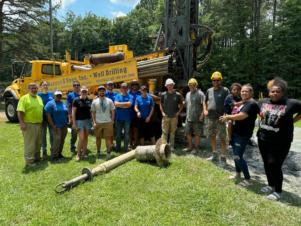With the recent selection of Paul Ryan as republican presidential candidate Mitt Romney’s running mate, the 2012 presidential election is in full swing. Over the next few months, you will be “treated” to news, campaign speeches, advertisements, etc. full of election coverage. As a contractor, make sure you are invested in the topics important to you and your business. Recently, Mechanical Hub talked with PHCC—National Association President Keith Bienvenu, Bienvenu Brothers Plumbing, Metairie, La., about the upcoming presidential election.
 Hub: With an up-and-down economy, where consumers and contractors alike are cautiously optimistic, the upcoming presidential election could be a make or break year in terms of legislation relating to contracting business. (Health insurance, taxes, etc.) What are some of the issues facing contractors that are important in terms of this year’s election? What are some of the concerns/issues facing the industry that the PHCC has identified, and what are some of the issues for which it has campaigned?
Hub: With an up-and-down economy, where consumers and contractors alike are cautiously optimistic, the upcoming presidential election could be a make or break year in terms of legislation relating to contracting business. (Health insurance, taxes, etc.) What are some of the issues facing contractors that are important in terms of this year’s election? What are some of the concerns/issues facing the industry that the PHCC has identified, and what are some of the issues for which it has campaigned?
Bienvenu: The Presidential election is always important…for many reasons. Those seeking the White House express their views on a myriad of issues impacting the economy, business, social groups, religious sectors, etc., and then let the American people decide who they believe is best for the job. This Presidential election has been, and will be, no different.
As the candidates posture to find the “hot buttons” and strategies that can help them win the race, the nation—and world—continue to be consumed with the most recent job and economic reports. There are other issues that may be in the headlines for a day or so, but the focus usually comes back to the economy.
But lurking behind the scenes are several issues of interest to small businesses that, realistically, won’t resurface until after the presidential election. Those include the expiration of tax cuts, implementation of health care reform and a strategy to address the national debt.
Although exact presidential election issues of interest for individual PHCC members can vary according to political beliefs and personal circumstances, the association lobbies on top priorities established through a Government Relations Committee. Those current key issues include repeal of the estate/death tax, a more workable EPA Lead Renovation, Repair and Painting Rule and consideration by the U.S. Dept. of Energy of PHCC’s input on the proposed workforce guidelines associated with the Weatherization Assistance Program (WAP).
As important as the views of the President are, much attention must be focused on the tone the current, and the future, Administration will set. The tone an Administration establishes will reflect the direction it intends to take regarding the governing of America (both in terms of opportunities for industry and possible destructive situations as identified by industry).
In the regulatory arena, one of the greatest threats to small business concerns methods in which policy is developed in this country. A democracy is founded on the ability to allow “the people” to be heard. In the past few years, there has been a steady shift to develop policy by regulators, which has the direct effect of taking the voice away from “the people.” We elect legislators, not regulators. In that sense, issues on Capitol Hill sometimes become almost irrelevant, as federal agencies develop what they believe is in the best interest of the nation without input from elected officials (legislators).
As an example, PHCC National is engaged in a battle with the U.S. Dept. of Energy regarding workforce guidelines for the federal Weatherization Assistance Program (WAP). The program seeks to certify individuals to conduct energy efficiency tasks in a home. Though this on the surface may not seem unreasonable, the standards and specifications are being written by the government with little input from industry experts. Many of the tasks involve plumbing and HVAC—tasks that only a seasoned professional can responsibly perform.
 Hub: Do you feel that voting is an important step for change, or consistency, for that matter? Or does the gridlock between the House & Senate have some turned off?
Hub: Do you feel that voting is an important step for change, or consistency, for that matter? Or does the gridlock between the House & Senate have some turned off?
Bienvenu: “Gridlock” can be politically motivated strategically, but is always the direct result of a system of “checks and balances.” Make no mistake, what may seem like chaos or “gridlock” to most Americans, is actually a democracy in action. When ideologies clash, gridlock occurs, and while many may not be comfortable by what they feel is gridlock in Washington, know that if not for gridlock, your own views may be overrun.
These are extremely important times in our nation. Federal budget spending and national budget policy—and the ways we are going about our spending—are being considered and re-evaluated for the first time in recent memory.
Hub: Have you encountered, or heard, of any misconceptions mechanical contractors have about the upcoming presidential elections?
Bienvenu: Contractors are very astute political people. They view life and business with a unique perspective and they draw conclusions on their own without any interference. I think that for many Americans the only true misconception regarding the upcoming Presidential election (or any election for that matter) is when they feel that their vote – their participation in the process – can’t or doesn’t make a difference. There is nothing more important than involvement, and those who practice or participate always see a return on their investment.
Hub: Other than voting, how can contractors’ voices be heard? How can they get more involved in the legislative process?
“How do I get involved?” is probably the most common question asked when it comes to the legislative process. The second most common questions is: “Can my voice really make a difference?”
I can tell you with confidence that if you make the effort to be an active participant in the legislative and regulatory process, your opinions will be heard, and you’ll see results.
Like anything else, there is true strength in numbers. Many voices carrying the same message have much more influence than just one. The secret is to become educated on issues and to make your voice heard.
To keep members informed of the latest legislative and regulatory news, PHCC—National Association publishes two updates a week. And as issues arise throughout the year PHCC National releases a series of legislative and regulatory “Action Alerts” that allow contractors to participate and be heard on matters that affect them.
When it comes down to it, it’s up to you to get involved. It’s easy to do. Just make sure you get to know your members of Congress. Visit them every opportunity you get. Call the district office and make an appointment. Go to events you know they will be attending. Let them know you are willing to be a resource on industry and small business issues. Then they will be sure to recognize your name and pay attention to what you’re saying. This is the foundation of what is commonly described as “grassroots.” Remember that if you are not speaking up for issues that are important to your business you are missing an opportunity. You CAN make a difference!
Here is a recent example how PHCC members have had a direct influence on national policy making: Through PHCC’s Legislative Alert system, many members recently conveyed strong messages to House Subcommittee on Oversight and Investigation Chairman Cliff Stearns about PHCC’s frustration over workforce guidelines for the federal Weatherization Assistance Program (WAP). These efforts followed a letter I wrote to Chairman Stearns on the issue. As a result of this orchestrated communication, Chairman Stearns contacted PHCC to set up a meeting to discuss those concerns, giving us a direct forum to present the plumbing and HVACR contractor’s perspective of the guidelines. This is a true example of the power of combining an individual and collective voice.
Of course, the most direct way to get involved is to participate in PHCC’s annual Legislative Conference, a two-day meeting held each spring in Washington, D.C. During the conference attendees receive issue briefings and an orientation before going to Capitol Hill to advocate on behalf of the industry. PHCC members made progress on key lobbying issues during the 2012 conference, and were invited to participate in two new small business roundtables on Capitol Hill.
So for anyone who is thinking of getting involved in the legislative and regulatory process, I encourage you wholeheartedly. I’ve seen the results, and can attest to the feeling of fulfillment you get when you know you’ve been a direct part of our great American democracy.
For more information on the PHCC, visit phccweb.org.




Join the conversation: